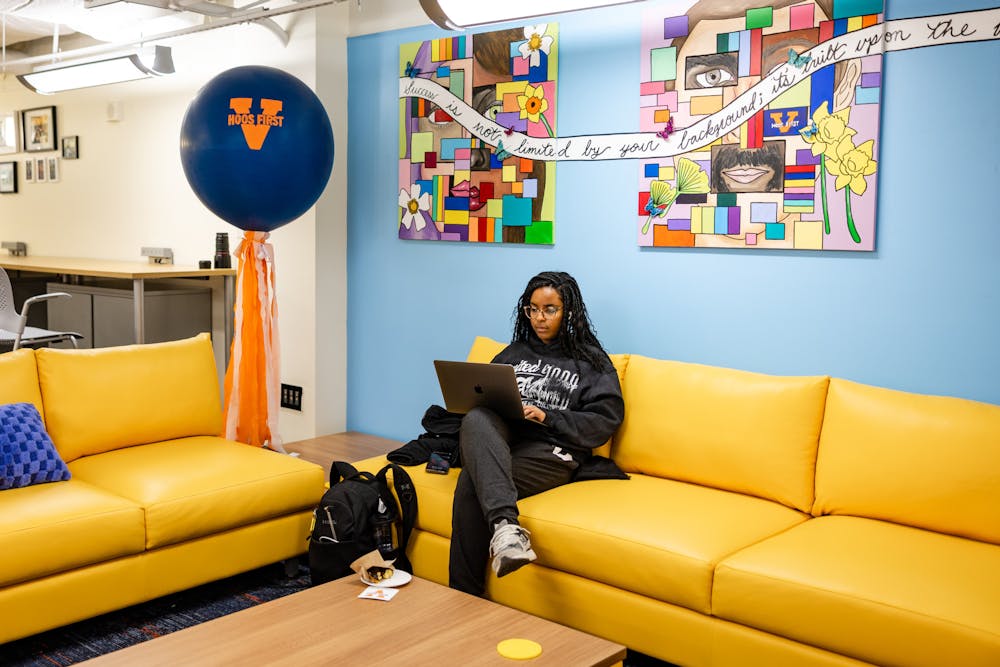The Hoos First Student Center, located in the lower level of Newcomb Hall, welcomed students into a vibrant and playful space at its grand opening Friday morning. The center serves as a hub for first-generation and low-income students to study, relax and connect with those who have similar backgrounds.
The University identifies first-generation students as those whose parents or guardians did not acquire a four-year degree. Many first-generation students face more barriers than their peers when navigating college resources, choosing classes and determining their career paths. The HFSC strives to support these underrepresented students, enabling them to make the most out of their college experience.
The HFSC held a soft opening Thursday afternoon, welcoming student leaders, faculty and staff to its doors before beginning its official operating hours. The soft opening showcased speeches from President Jim Ryan and Interim Dean of Students Cedric Rucker. As first-generation college students themselves, both speakers described the challenges they faced in college and expressed their gratitude for all who helped create the HFSC. Rucker commended the University’s support for FGLI students, recognizing how the center builds community among students with shared experiences.
“I love the idea that U.Va. has invested in a place where you don't have to hide,” Rucker said. “You can feel welcome … and you know that people understand what you're going through.”
Michelle Bair, director of Hoos First FGLI student initiatives and the primary organizer in the creation of the center, welcomed visitors as they entered the HFSC. As a first-generation student from VCU, Bair has dedicated herself to helping FGLI students navigate college.
“The force behind the work that I do is just thinking about or wishing that I had a space like this,” Bair said. “Had I been involved in something [like this] in undergrad, I think my experience would have been a lot different.”
Filled with colorful handmade art and inspirational quotes, the HFSC’s cozy atmosphere provides space for both quiet study sessions and social gatherings. Bookshelves showcase a diverse array of novels, many of which detail the stories and experiences of FGLI students. At the grand opening, students were offered snacks and branded merch — cups, pens and laptop stickers. They could also enter a raffle to win items ranging from campfire mugs to fanny packs.
Many Contracted Independent Organizations across Grounds offer assistance for FGLI students. One CIO, the First Generation/Low Income Partnership, aims to foster community and empower FGLI students. Brianna Seekford, outreach chair of FLIP and third-year College student, said the HFSC is a crucial resource that will propel FLIP’s mission onward.
“I feel like being ‘first-gen’ at U.Va. means you come in blind … It's a learning process of how to make connections,” Seekford said. “The center is really going to help make those connections for me and open up a network of people.”
Second-year College student Eden Abebe also highlighted how first-generation students struggle to orient themselves in college without family support.
“[College is] difficult to navigate, especially when you don't have guidance [from] parents who are educated and have that college experience,” Abebe said. “You're just trying to figure it out.”
For Abebe, the HFSC helps alleviate some of these challenges, providing students with a space to meet peers with similar backgrounds.
“[The center is] really allowing us to make sure we're headed on the same road to success no matter where we started from,” Abebe said.
Although its primary purpose is to build a space for FGLI students, the center welcomes all University students. Second-year College student Mahlet Nebiyu, although technically not considered a FGLI student, viewed the HFSC as a triumph for all underrepresented students.
“It makes us realize that we're not that small,” Nebiyu said. “I feel like minorities are coming to a space like this where you see that you're recognized and supported.”
The grand opening struck a special chord with alumni and faculty members, many of whom cited their FGLI background as inspiration for their current service at the University. For Heather Palmer, assistant director of the Center for Engineering Career Development and Class of 2002 alumna, being a FGLI student strengthened her resolve to succeed in college — a sense of confidence that she hopes to instill in other students.
“I remember taking every single tip and advice that people gave,” Palmer said. “I wasn't sure if I belonged, but I wanted to prove that I did.”
Alicia Cowan-Brown, program coordinator for the Clark Scholars Program and Class of 2017 alumna, noted how support for FGLI students has expanded over the years. Having attended the University at a time when terms like “first-gen” were not as pervasive, she said its frequent use today demonstrates meaningful change in the way colleges welcome FGLI students.
“I’m so happy to have the space to support [FGLI students],” Cowan-Brown said. “I feel like ‘first-gen’ is becoming more of a wider population than it was when we were here.”
The HFSC, a well-equipped space for both academic goals and community-building, represents another step in increasing support for FGLI students. For Rucker, the center is not a singular achievement but an integral part of the University’s ongoing aid to underrepresented groups and first-generation students.
“It’s important for me that other first-gen, low-income students recognize that the line does not stop here,” Rucker said. “This is the beginning, not the end.”







